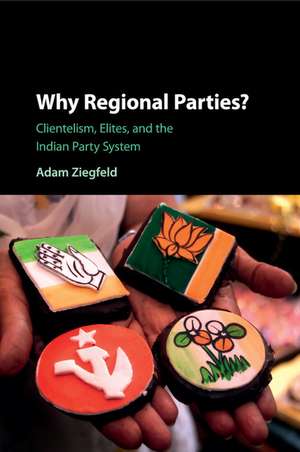Why Regional Parties?: Clientelism, Elites, and the Indian Party System
Autor Adam Ziegfelden Limba Engleză Paperback – 7 feb 2018
| Toate formatele și edițiile | Preț | Express |
|---|---|---|
| Paperback (1) | 288.04 lei 6-8 săpt. | |
| Cambridge University Press – 7 feb 2018 | 288.04 lei 6-8 săpt. | |
| Hardback (1) | 547.39 lei 6-8 săpt. | |
| Cambridge University Press – 18 feb 2016 | 547.39 lei 6-8 săpt. |
Preț: 288.04 lei
Nou
Puncte Express: 432
Preț estimativ în valută:
55.12€ • 58.94$ • 45.96£
55.12€ • 58.94$ • 45.96£
Carte tipărită la comandă
Livrare economică 18 aprilie-02 mai
Preluare comenzi: 021 569.72.76
Specificații
ISBN-13: 9781107546813
ISBN-10: 1107546818
Pagini: 308
Ilustrații: 21 b/w illus. 14 tables
Dimensiuni: 153 x 230 x 20 mm
Greutate: 0.46 kg
Editura: Cambridge University Press
Colecția Cambridge University Press
Locul publicării:New York, United States
ISBN-10: 1107546818
Pagini: 308
Ilustrații: 21 b/w illus. 14 tables
Dimensiuni: 153 x 230 x 20 mm
Greutate: 0.46 kg
Editura: Cambridge University Press
Colecția Cambridge University Press
Locul publicării:New York, United States
Cuprins
1. Introduction; 2. Definitions and description - regional political parties in India; 3. Theory - clientelism, elites, and regional parties; 4. Evidence - elites and regional party success in India; 5. Cross-national variation - clientelism and institutions; 6. India's successful regional parties - the costs of building national parties; 7. Longitudinal variation in India - coalition government and the rise of regional parties; 8. Subnational variation in India - factional sorting and elite divisions; 9. Conclusion.
Recenzii
'Ziegfeld's book innovates both in research on party systems in general and Indian democracy in particular. He provides a novel elite-centered explanation for the rise of 'regional' parties that do not cover the whole of a country's electoral districts, even though they are not grounded in demand-side 'regionalist' ethno-cultural or political identities. Furthermore, he explains why regional parties are more likely to emphasize clientelist relations with their voters. Finally, he applies this theory to India to account for the presence and expansion of regional political parties to the detriment of national parties with the advent of national coalition governments. Students of political parties across all regions of the world will benefit from absorbing this exemplary investigation just as much as those aspiring to understand the challenges faced by India as the world's largest democracy in the twenty-first century.' Herbert Kitschelt, Duke University, North Carolina
'Why do regional parties emerge and thrive in certain countries but not others? How does their rise affect levels of democratic representation and accountability within developing democracies? In this fascinating and valuable study, Ziegfeld argues that regional parties do not emerge because disappointed voters demand alternatives to poorly performing national parties. Instead, regional parties are deliberately crafted by political elites because of advantages such formations enjoy within decentralized, clientelistic, and fragmented electoral arenas across the developing world. Ziegfeld's argument is primarily based on meticulous research from India, from which he skillfully derives broader insights for understanding this important, yet understudied, class of political parties. The book thus deserves attention from scholars broadly interested in political parties, elections, and clientelism, as well as those specifically concerned with the maturation of the world's largest democracy.' Tariq Thachil, Yale University, Connecticut
'Why do regional parties emerge and thrive in certain countries but not others? How does their rise affect levels of democratic representation and accountability within developing democracies? In this fascinating and valuable study, Ziegfeld argues that regional parties do not emerge because disappointed voters demand alternatives to poorly performing national parties. Instead, regional parties are deliberately crafted by political elites because of advantages such formations enjoy within decentralized, clientelistic, and fragmented electoral arenas across the developing world. Ziegfeld's argument is primarily based on meticulous research from India, from which he skillfully derives broader insights for understanding this important, yet understudied, class of political parties. The book thus deserves attention from scholars broadly interested in political parties, elections, and clientelism, as well as those specifically concerned with the maturation of the world's largest democracy.' Tariq Thachil, Yale University, Connecticut
Notă biografică
Descriere
The first major study of India's regional parties which discusses why, when, and where they are electorally successful.












